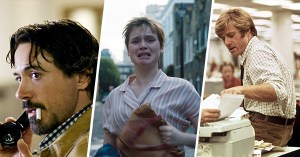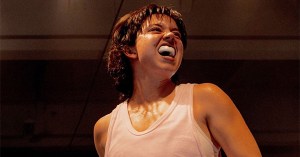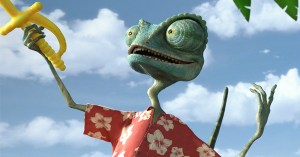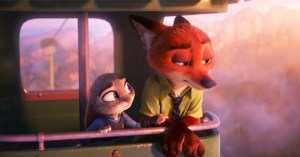Interview: Joaquin Phoenix on Her, Celebrity, and Why He Loves Acting
A conversation with the star of Spike Jonze's critically acclaimed near-future romance, in which Phoenix reflects upon the strangeness of being a movie celebrity, his admiration for his director, and what he still loves about being an actor.
Spike Jonze’s latest movie, the near-future romance Her, is that rarest of creatures — a genuinely original new American film. Pitched somewhere between philosophical satire and sincere heartache, the story of a lonely man (Joaquin Phoenix) and his love affair with his computer’s operating system [Scarlett Johansson) is both funny and poignant without trying too hard to be either — a hallmark of Jonze’s best work. And it features another shape-shifting performance from the peerless Joaquin Phoenix, who, having literally chewed scenery for a volcanic turn in The Master, explores a warmer, more interior side to his acting range — and comes up with another performance for the ages.
We sat down with Phoenix recently to talk about Her, where the actor offered some candid remarks about the media machine, his admiration for Jonze, and why he’s still, well, here.
Well, you seem to be in good spirits. I guess you’ve gotta be happy with this movie.
Joaquin Phoenix: Yeah. But whether I’m happy with a movie or not, I don’t think it affects that much how I interact with the press. Sometimes I’m just either in a good mood and feel like talking to people, or sometimes I don’t. [Laughs] It’s not necessarily related to the movie. Sometimes those press conferences are so weird, and I always feel uncomfortable. Like, I went to one a couple of years ago for The Master, in Venice, and it’s like, you get off this boat and you walk down this huge stretch and there’s people coming up and taking pictures and chasing you in the weirdest way. So it’s just this really uncomfortable feeling and it creates this really weird energy. And then you walk into this room and there are 60 people, and they’ve been sitting thee for an hour not knowing when the actors are gonna show up, so that must be really frustrating for them, and then they all know each other and they have their own personal relationships and that dynamic, so it’s such a strange situation to walk in to. You go from being with your friends and talking about whatever it is, right, just sitting around talking and having a coffee, to suddenly going into this room where it’s always so strange. I have a hard time making those transitions. [Laughs] I think sometimes it just feels, I don’t know, it just feels so inauthentic. And then you get these questions where people want to be really authentic and talk to you, and you go, “Well, the whole situation is f**king strange to begin with,” you know.
And everybody wants their little sound bite for their outlet.
And it’s understandable, but it’s such a weird thing. it’s like, we’re all trying to essentially achieve the same thing, right?
Yeah, I find press days really strange. There’s a scene in Her about the false nature of what Theodore thinks is an “exclusive” relationship, and they’re kinda like that — a lot of people think they’re special for 10 minutes, like they’re best friends with the actor or whatever, but it’s all just generic. Everybody’s essentially saying the same thing.
[Laughs] Yes! It’s the same thing. Oh god, it’s a horrible feeling.
You must go crazy at some point; it’s like person after person after person shuffling in.
But everybody does! I feel like it’s some kind of weird society. Like, who’s actually up at the top? We’re sitting there squabbling but we’re all just eating at the same buffet table trying to get through the f**king day and s**t. Yeah, it’s always a weird dynamic, but that’s part of it — and there’s something that can be interesting in that. There actually are times where I feel like I’ve really had conversations with people, even if it is brief. Sometimes you have a relationship with somebody, and it doesn’t last as long as another one, but that doesn’t mean it’s any less valid, you know? Sometimes I have had moments where I’ve spoke with somebody, and there have been times where I’ve discovered something with a person and then you keep sharing that discovery with the next 10 or whatever. Sometimes it really is a genuine discovery, you know; sometimes you really do meet people that are interesting. There is something curious about it.
For sure. Let’s talk more specifically about your performance in Her. You’re such an inventive actor, to go from something like The Master to this. What sets the context for this kind of performance? How do you draw out such a different side of your personality on screen?
It’s everything. I mean, that’s the thing about acting, it’s never one thing. I could be on the set with all the right clothes and be working with a different actor and it’s gonna completely alter it. Where they place the camera is going to alter my performance. How they cut it. There are so many different elements that come together, and I think that’s probably what’s so exciting about it. That’s why you can never be certain, going in to it, of what it’s going to be — ’cause you have to interact with other people.
I guess for this, in some ways, it was funny because the history of the character was the most important thing; I guess that seems like an obvious thing for every character, but because we meet him in a place, emotionally, that’s so different from how he normally is, it was really about discovering “Who was he?” and “What was that life?” and “What was the relationship that he had, and why did it mean so much to him?” To be frank, I’ve never had a relationship that affected me the way that this relationship affects Theodore — his previous relationship with Catherine, and the divorce. I don’t think I’ve ever been that affected by a relationship — so there was a part of me that was like, “What, it’s been more than a year? And you’re saying that I’m still affected by this?” So it was something that was very foreign to me, ’cause I don’t think I’ve ever been maybe in a relationship that was that involved, you know what I mean?
Do you think a lot of that was Spike’s personal stuff?
Ah, I think because he’s been married before, and everybody who’s been married has their idea of what marriage is. But yeah, it was interesting — but more than just marriage, it was just a relationship, married or not; to feel that connected to somebody. That was something that was really foreign to me, so I think the first step was really kinda thinking up who Theodore was before the divorce. That helped to inform where he was going, I guess.
It’s weird because the cool thing about acting is that it’s this constant ongoing process, and there are things like, you’re making discoveries on the last f**king day that you’re shooting. And I know what it’s like to just be an audience member, and to look at something and go, “Oh, well they must have had that all figured out,”” and you realize that what’s exciting is that you’re reacting to these new things that come about. Sometimes actors, they have their perspective on something, and it’s something you haven’t thought of. Why I love acting — why it stays exciting — is that it’s always moving an evolving.
Spike said something curious in another interview, that he was amazed you could understand his direction. Why is that?
I think he was just being sweet. Sometimes you just say things. I think what it is is that, well — he can be very specific — but you know, there are some directors who are just looking for one thing, and Spike looks for like five things. So it’s that, on set, you’re trying to keep 20 different ideas alive, as possibilities that you can grab on to at any moment. He’s the kind of director who can notice if you’re settling into something that’s becoming rote, and you’re suddenly just kind of going through this thing. And he doesn’t like that. Of course, as an actor, part of it is that you’re trying to have this experience, but you’re also trying to fulfill the needs of the director — you know, I’m there to work for him, and help him achieve what he wants. So there are times where you can settle into just doing something in a particular way, when we’ve already shot this. It’s what’s so exciting about working with him — he’s constantly looking for other colors. And even though you may be angry, or maybe you feel embarrassed that you’re angry as well. So you can be angry, but also embarrassed that you’re angry simultaneously, and to start piling on these different colors and emotions and feelings, that’s something that’s rare — because you have such a limited time to tell a story in a movie, and you try to condense everything to the short hand, and you try and make it as easily digestible for as many people as possible — at least I think that’s what most people do — and I think Spike tries to do what feels most truthful and honest; even if it’s something that’s difficult, and in a language that we’re not accustomed to, or a film language that we’re not accustomed to, he’s still willing and wanting to explore that. And maybe, if he was being honest, when he said I understood his direction, maybe it’s just a willingness at some point to go with him on these things. Does that make any sense?
Absolutely, you can see it all on screen. The emotions in Her, like you say — there are so many things going on simultaneously. You might feel elated, and sad, but it’s also funny at the same time.
Yeah, that’s it. And you don’t think that it’s possible. Sometimes you just read a script and you think, “He’s not gonna be able to pull this off,” but somehow, he does.
Her opens in limited release this week and goes wide January 10. Look for our interview with director Spike Jonze soon.






